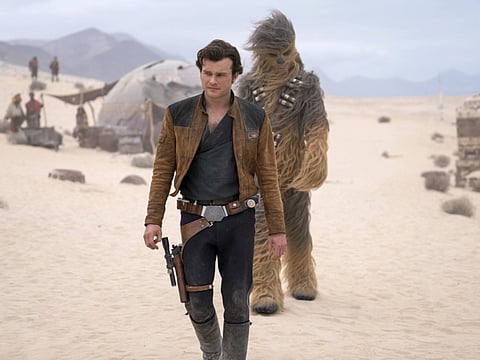‘Star Wars’ movies to ‘slowdown’ says Disney
CEO Bob Iger admits there’s been too much of a good thing following the box office performance of ‘Solo: A Star Wars Story’ earlier this year

There is a disturbance in the Force.
After the lacklustre performance of the latest instalment in the wildly popular Star Wars saga, Disney is tapping the brakes on the franchise — an acknowledgment that there can be too much of a good thing.
In an interview published Thursday, CEO Bob Iger told The Hollywood Reporter that Disney plans to slow down the Star Wars release schedule, admitting that it had been a mistake to shuttle a new film into theatres every year.
“I made the timing decision, and as I look back, I think the mistake that I made — I take the blame — was a little too much, too fast,” Iger said.
“You can expect some slowdown, but that doesn’t mean we’re not going to make films.”
Disney — which paid $4 billion (Dh14.6 billion) for Lucasfilm in 2012 — had promised a new Star Wars movie every year after the hotly-anticipated 2015 release of The Force Awakens: news they believed would delight fans around the world.
After all, The Force Awakens picked up 30 years after the events of 1983’s Return of the Jedi and came a decade after the previous Star Wars movie of any kind.
But Disney, whose initial plan was to alternate releases between chapters in the main series launched in the late 1970s and one-off films expanding the Star Wars universe, seems to have learned that anticipation is part of the equation.
Earlier this year, the standalone Solo: A Star Wars Story earned $400 million (Dh1 billion) worldwide — a stellar result for most movies, but a mediocre return for a Star Wars film, leading many industry observers to speculate about franchise fatigue.
In contrast, Star Wars: The Last Jedi, which was released just six months before in late 2017, earned more than $1.3 billion (Dh4.7 billion) worldwide.
The next film — Episode IX, announced as the last instalment in the main Skywalker saga, and directed by JJ Abrams — is due for release in December 2019.
Sign up for the Daily Briefing
Get the latest news and updates straight to your inbox



